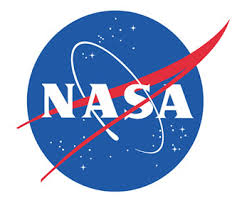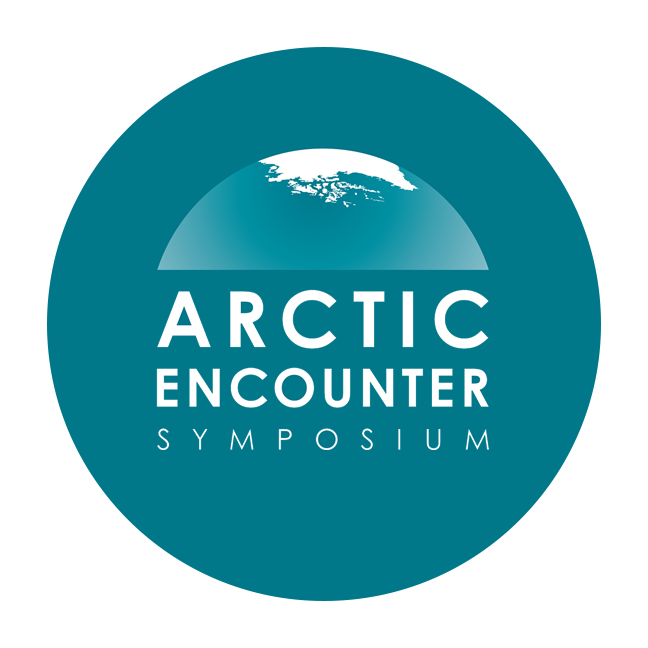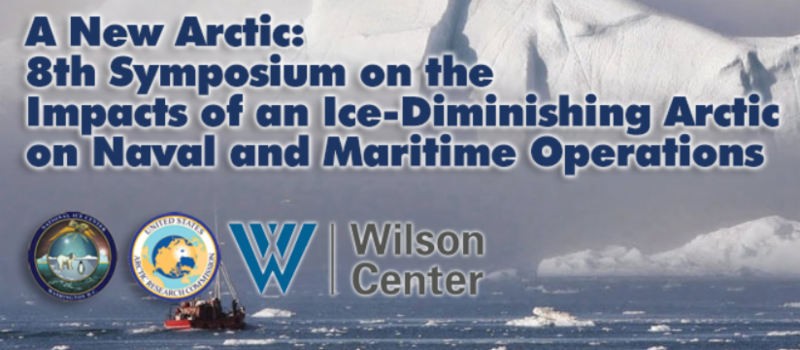|
|
|
|
|
|
|
|
|
Today, no Arctic-science events are scheduled.
|
Media
New Perspective on Changing Travel Conditions in Arctic Communities. Inuit communities' travel skills and regional knowledge have helped mitigate the effects of Arctic climate change on travel conditions, according to a new study. The Arctic is warming nearly twice as quickly as the rest of the world and has the potential to affect many aspects of life for the people that live there. The semi-permanent trails used by Indigenous communities on sea-ice, rivers and frozen ground are vulnerable to warming conditions which can cause sea-ice melt and flooding. Phys.org
 New Arctic Defense Strategy Expected to Zero in on Concerns About China. New Arctic Defense Strategy Expected to Zero in on Concerns About China. The Trump administration is drafting a new Arctic defense strategy focusing heavily on competition with China, whose expansion around the world has drawn increasing scrutiny from senior U.S. officials. The document will outline how the Pentagon "can best defend U.S. national interests and support security and stability in the Arctic," said Johnny Michael, a Pentagon spokesman. It will do so, he said, within the framework of the Pentagon's national defense strategy, which last year emphasized shifting the military away from counterterrorism operations to so-called "great-power competition" with Russia and China. Stars and Stripes
Arctic Council Reviews Its Performance Over the Past Two Years. The last Senior Arctic Officials' meeting of the Finnish Chairmanship (2017-2019) was held in Ruka, Finland. The participants reviewed the council's performance over the past two years and approved materials that will be forwarded to the council's Ministerial Meeting in Rovaniemi scheduled for May 6-7, 2019, when Iceland will take over the council's chairmanship, the Roscongress press service reported. The Arctic
 NASA's Greenland Mission Still Surprises in Year Four. NASA's Greenland Mission Still Surprises in Year Four. Only seven months after NASA's Oceans Melting Greenland (OMG) mission wrapped its last field campaign on the world's largest island, an OMG crew is back in Greenland to collect more data. With two or three field projects a year since 2016, no wonder OMG has made the most comprehensive measurements yet of how ocean water lapping at the undersides of Greenland's melting glaciers affects them. All that data has answered a lot of existing questions -- and it's raised plenty of new ones. Space Ref
|
|
Future Events
Public Lecture: Sea Level Rise and What We Should Do About It, March 27, 2019 (Washington, DC, USA). The National Academies of Sciences, Engineering and Medicine hosts this event. How are melting ice sheets causing sea level rise and what can we do about it? The ice sheets in Greenland and Antarctica, along with glaciers and ice caps around the world, are melting faster than anticipated as a result of climate change caused by greenhouse gases from human activities. This rapid evolution--resulting from complex interactions between the atmosphere, the ocean, and ice--has been captured in great detail by a growing body of observational platforms that include satellites, aircraft, underwater floats, and autonomous gliders.
 of the AAG includes over 8,500 geographers converging from the U.S., Canada, and nearly 60 other countries in a typical year including geographers, GIS specialists, environmental scientists, and other leaders for the latest in research and applications in geography, sustainability, and GIScience. of the AAG includes over 8,500 geographers converging from the U.S., Canada, and nearly 60 other countries in a typical year including geographers, GIS specialists, environmental scientists, and other leaders for the latest in research and applications in geography, sustainability, and GIScience.
 The 6th Annual Arctic Encounter Seattle, April 25-26, 2019 (Seattle, WA, USA). The sixth annual Arctic Encounter Seattle will engage the topic of innovation in the Arctic, specifically disruptive business and investment models, energy and power, climate research, national security, new economic and trade models, and popular media and awareness movements impacting the Far North. The 2018 Arctic Encounter Seattle drew over 300 participants from across Alaska, the U.S., and the world, including over 100 speakers, 32 sponsors, 11 media partners, fashion and photography installations, a live permafrost exhibition, 13 guest performers, fashion designers, and artist exhibitors to the downtown Seattle waterfront at Pier 66. The 2019 Arctic Encounter Seattle expects to increase engagement in new sectors and engage participants through policy debates, research presentations, performances, and more. The two-day Arctic Encounter Seattle will include an opening reception, two continental breakfasts, two keynote luncheons, a networking reception with Alaskan glacier ice cocktails, and a seated three course dinner including keynotes and live musical entertainment from the Far North. The Arctic Encounter is the largest annual Arctic policy and business conference convening in the United States, with partnerships and convening efforts worldwide. Registration is now open. Additional information is available here. The 6th Annual Arctic Encounter Seattle, April 25-26, 2019 (Seattle, WA, USA). The sixth annual Arctic Encounter Seattle will engage the topic of innovation in the Arctic, specifically disruptive business and investment models, energy and power, climate research, national security, new economic and trade models, and popular media and awareness movements impacting the Far North. The 2018 Arctic Encounter Seattle drew over 300 participants from across Alaska, the U.S., and the world, including over 100 speakers, 32 sponsors, 11 media partners, fashion and photography installations, a live permafrost exhibition, 13 guest performers, fashion designers, and artist exhibitors to the downtown Seattle waterfront at Pier 66. The 2019 Arctic Encounter Seattle expects to increase engagement in new sectors and engage participants through policy debates, research presentations, performances, and more. The two-day Arctic Encounter Seattle will include an opening reception, two continental breakfasts, two keynote luncheons, a networking reception with Alaskan glacier ice cocktails, and a seated three course dinner including keynotes and live musical entertainment from the Far North. The Arctic Encounter is the largest annual Arctic policy and business conference convening in the United States, with partnerships and convening efforts worldwide. Registration is now open. Additional information is available here.
North X North Festival, May 1-5, 2019 (Anchorage, Alaska USA).The third annual North x North Summit & Festival celebrates connection and culture across the North. The event features five days of conversations, workshops, exhibitions, performances, presentations, music, dance, installations, food, film and experiences highlighting Northern people, landscapes and cultures.The Summit (May 1-2), which is open to registered participants, focuses on resilience and research, with a special emphasis on gender and Indigenizing. The Festival (May 3-5) is open to the general public and features activities and conversations around climate, gender, innovation, food, indigenizing and earthquakes.
Lowell Wakefield Fisheries Symposium, May 7-10, 2019 (Anchorage, Alaska USA). This symposium aims to provide a forum for discussion on ways to facilitate effective cooperative research, a platform for scientific talks on the application and results of cooperative research, and opportunity to evaluate how such research might be best envisioned, applied and implemented. The symposium aims to involve participants from a variety of relevant marine industries, address these issues through facilitated discussion, identify best practices, and articulate a set of case studies for effective collaboration. The symposium also aims to involve scientists from a wide range of sectors, including state and federal agencies, universities, research institutes and industry science. This event is sponsored by Alaska Sea Grant College Program.
Arctic Science Summit Week, May 22-30, 2019 (Arkhangelsk, Russia). The Arctic Science Summit Week 2019 will take place in Northern (Arctic) Federal University and Northern State Medical University, Russia, Arkhangelsk. Under the auspices of International Arctic Science Committee, participants from more than 23 countries and regions will be involved.
Resilience in Rapidly Changing Arctic Systems, proposals close June 14, 2019. This joint Belmont Forum CRA calls for co-developed and co-implemented proposals from integrated teams of natural and social scientists, and stakeholders to address key areas of arctic resilience understanding and action. This collaboration of academic and non-academic knowledge systems constitutes a transdisciplinary approach that will advance not only understanding of the fundamentals of arctic resilience but also spur action, inform decision-making, and translate into solutions for resilience. The term "stakeholder" is used here in its broadest possible sense, allowing for co-development of projects with partners from, but not limited to, civil society, government, industry, NGOs, and Indigenous organizations.

Mark your calendars to attend IDA-8, which some have called one of the best Arctic gatherings around. Historically, this biennial symposium was co-hosted by U.S. National/Naval Ice Center (NIC) and the US Arctic Research Commission (USARC). In 2019, these partners will join forces with the Wilson Center's Polar Institute, and the Patuxent Defense Forum (run by the Patuxent Partnership) as co-hosts. The now 2-day symposium will be held in the Ronald Reagan Building Amphitheater, in Washington, DC. The event will focus on a broad cross-section of naval and maritime operations and issues in an ice-diminishing Arctic. The symposium brings together nationally and internationally recognized experts on Arctic governance, geopolitics, marine operations, infrastructure, science, and environmental observations, from the local, regional, and pan-Arctic scale. Information on prior symposia, including lists of speakers, video clips, and copies of presentations, is available here. Attendance is free, and registration will begin in Spring 2019. The event will be webcast live, and video recorded.
** New this week ** 2019 Sea Ice Symposium, August 18-23, 2019 (Winnipeg, Manitoba Canada). IGS co-hosts a sea ice symposium every 5 years. The Centre for Earth Observation Science (University of Manitoba) is excited to be hosting the first IGS event to be held in Canada. The symposium will include oral and poster sessions, and will provide a friendly and intellectually stimulating environment to facilitate face-to-face interactions and networking. Additional activities will include an opening reception, a banquet dinner and a mid-symposium afternoon excursion.
|
|

  
4350 N. Fairfax Drive, Suite 510
Arlington, VA 22203, USA
External links in this publication, and on the USARC's World Wide Web site ( www.arctic.gov) do not constitute endorsement by the US Arctic Research Commission of external Web sites or the information, products or services contained therein. For other than authorized activities, the USARC does not exercise any editorial control over the information you may find at these locations. These links are provided consistent with the stated purpose of this newsletter and the USARC Web site.
|
|
|
|
|
|
|
|
|